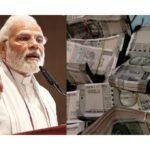Former President Donald Trump has reaffirmed his strong personal relationship with India but has also highlighted a significant concern: India’s high tariffs on U.S. goods.
In a recent interview with Breitbart News, Trump expressed his belief that India would eventually lower its tariffs, but he also reiterated his threat to impose reciprocal tariffs on India starting April 2 if the issue is not addressed.
The Tariff Dispute: A Long-Standing Issue
Trump has often criticized India for its high tariffs, describing the country as one of the “highest tariffing nations in the world.”
During his interview, Trump stated that while he has a “very good relationship” with India, the tariff issue remains a major obstacle to smoother trade.
He commented, “I believe they’re…probably going to be lowering those tariffs substantially, but on April 2, we will be charging them the same tariffs they charge us.”
This remark reiterates Trump’s position on imposing tariffs in retaliation if India does not take steps to lower its trade barriers.
India’s Efforts to Address the Trade Imbalance
Despite Trump’s criticisms, India has shown willingness to address trade imbalances. In the same interview, Trump referred to the India-Middle East-Europe Economic Corridor (IMEC), a strategic initiative involving the U.S. and several other nations, which he sees as a countermeasure against countries that engage in unfair trade practices.
However, Trump did not directly mention China in his remarks, but he did suggest that the nations involved in the IMEC are working together to challenge countries that harm U.S. trade interests.
He also took a swipe at the European Union, calling its trade treatment of the U.S. “terrible.”
Trump noted, “India and everybody would think of them as an ally. I can say the same for others.
But this is a group of wonderful nations that is countering other countries that look to hurt us on trade.”
Read Also:- Impact of Trump Tariffs: 3 Key Worries for the Crop and Chemical Industries
The Tariff Debate Continues
While Trump believes that India is likely to reduce its tariffs, Commerce Secretary Sunil Barthwal of India told a Parliamentary panel in New Delhi on March 10 that formal negotiations are still ongoing, with no concrete agreement reached yet.
This suggests that the U.S. and India still have considerable work to do to reach a mutually beneficial trade agreement.
Trump’s vocal opposition to high tariffs from countries like India is not new. In his address to Congress on March 4, he referred to India’s tariffs as “very unfair,” reinforcing his stance on the need for tariff reductions.
India’s Position: A Bilateral Trade Agreement in the Works
India has expressed its intention to reduce both tariff and non-tariff barriers as part of efforts to deepen trade ties with the U.S. During Prime Minister Narendra Modi’s recent visit to the U.S., both nations announced plans to negotiate a Bilateral Trade Agreement (BTA) that could address various trade issues, including tariffs.
This agreement is seen as a step toward creating a more balanced trade relationship, though it remains to be seen how quickly these negotiations will progress and whether both sides will be able to reach an agreement that satisfies their respective trade concerns.
What Lies Ahead for U.S.-India Trade Relations?
As the deadline for reciprocal tariffs approaches on April 2, both the U.S. and India are under increasing pressure to resolve the trade dispute.
With India facing potential tariffs on its exports to the U.S., the need for a compromise has never been more urgent.
The potential Bilateral Trade Agreement could pave the way for more open and mutually beneficial trade policies, but with both nations holding firm on key issues, the final outcome remains uncertain.
The Road to Resolution
Both Trump and India’s government have expressed a desire for a fairer trade agreement, but the specifics are still in negotiation.
If the two countries can reach an agreement on tariff reductions and other trade matters, it could signal a new era of U.S.-India economic cooperation.
Until then, the tariff dispute will likely continue to be a key issue in the bilateral relationship.








